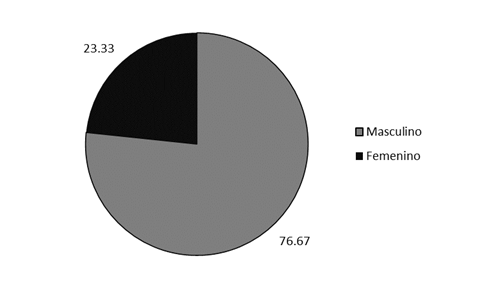Introduction
Universities have been generators of knowledge. Thus, they are the main centers for science development, where research processes jointly with education constitute the most significant missions to achieve important advances in university scenarios and social progress: (Barros & Turpo, 2020; Cárdenas-Zea et al., 2022; Reyes-Pérez et al., 2022; Quintana-Santiago & León-González (2022); Deroncele Acosta (2022, 2023).
According to Morrison (2013), university professors are characterized by their contribution to knowledge. The author asserts that scientific production is a productivity marker, which becomes the measurement for their academic evaluation. Furthermore, scientific production involves faculty to achieve article publications in indexed journals in prestige databases.
For Romero et al. (2021), scientific production is one of the main standards that should boost higher education institutions as a dissemination strategy for their research results. In this sense, investigations should be sustained through research projects to achieve good scientific production and dissemination of the results. On the other hand, Méndez-Martínez et al. (2021a), allude to transformation, which has started in Ecuadorian universities that try to get faculty involved in research projects and academic knowledge networks. This effort undertakes a significant economic investment for graduate studies to promote scientific production.
It is important to highlight that the current education scenario at Universidad Técnica Estatal de Quevedo (UTEQ), Ecuador conditions to strengthen research projects. Thus the need for university Faculty with the abilities required to allow good results and visibility. Jointly with the previous, UTEQ strengthens scientific production intended for the agricultural sector, directly with cacao research studies. This research field allows innovative solutions to production problems related to this cultivation that has a notable bearing in economy of the country and produces employment and currency. Therefore, the objective of this study is to analyze the Faculty criteria in their participation in university processes and role in research projects and scientific production at UTEQ.
Materials and methods
An exploratory-descriptive qualitative (EDQ) research was carried out at UTEQ and developed under a quantitative approach. This study agrees with McMillan & Schumacher (2005), in that research implies collecting information on the study variables. The technique used in data collection was a survey, and a questionnaire was used as an instrument formed by 11 questions, responding to the following:
Provide the name of the faculties to which the Professor belongs.
Specify gender to determine major presence of Faculty either masculine or feminine.
Provide types of projects in which the Professor participates.
Determine if the projects allowed generating scientific articles.
Determine if the articles are out of order.
What are the main barriers to venture in university processes?
What is the structure developed by the university to promote Faculty participation in university processes?
Have you considered that participating in university processes requires training, financial support, collaboration from the population object of study, counseling?
Was your project part of an agricultural product?
The population at UTEQ object of study was 103 Faculty members from Agricultural Science, Agronomy and Livestock Science, Environmental Science, Business Science. The sample was 30 professors.
In agreement with Pineda et al. (1994), with respect to population, it is a set of those who are interested in acquiring knowledge from research. The universe or population may be constituted by persons. On the other hand, the sample is a subset or part of the universe or population in which the research where procedures are followed, obtains the quantity of the sample components, such as formulas, logic and others. The quantitative analysis of the results was summarized by means of descriptive statistics. Once the responses were obtained, data was processed by the statistical package SPSS version 19.
Results and discussion
Once the survey responses were processed, the results were graphically represented. Each figure shows one of the survey questions. Figure 1 shows faculty composition according to their special field, of which 90% are from Agronomy and Livestock Science; 3.3% Environmental Science; 3.3% Agricultural Science; and 3.3% Business Science.
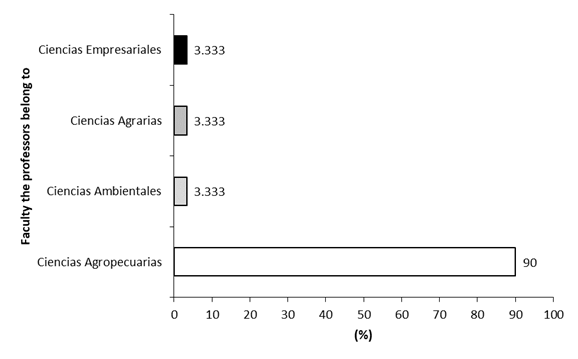 State University of Quevedo, Ecuador.
State University of Quevedo, Ecuador.Fig. 1 - Processing results of the special field each Faculty member belongs to Technical
Figure 2 shows that years of teaching experience of the Faculty is very different, of which the most representative (11 to 20) constitutes 36.67%; 23.3% those from 21-30; and 20% those over 31. The rest, 16.6%, is formed by faculty from six to 10 years of experience in teaching, whereas those from 1 to 5 years only indicate 3.3%. This indicator evidences that the university council has teaching experience.
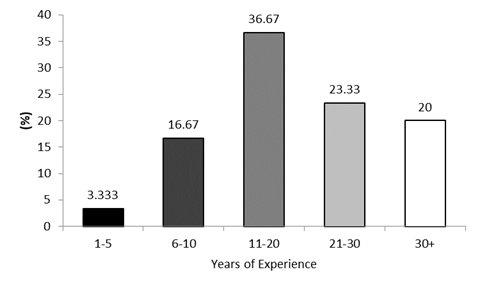 State University of Quevedo, Ecuador.
State University of Quevedo, Ecuador.Fig. 2 - Processing results on years of teaching experience of Faculty at Technical
When the Faculty gender analysis was performed, the results showed that 76.67% were masculine and 23.33% feminine (Figure 3).
Figure 4 shows the projects and Faculty that have participated, where 43.33% are technology transfer; 36.67% products; whereas 16.67% are services and only 3.33% have not participated in projects.
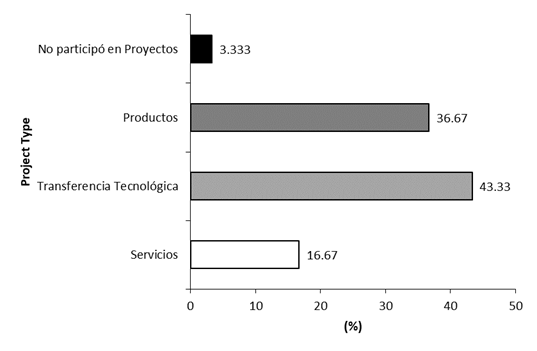 State University of Quevedo, Ecuador.
State University of Quevedo, Ecuador.Fig. 4 - Faculty participation in research projects at Technical
Because part of the research projects where Faculty participated was known through the survey results (although not shown in the chart), which were linked to several projects, such as maize, vegetables, banana, among others, the greater representation that stands out is related to cacao (85% of the Faculty surveyed) (Figure 4).
Figure 5 is shown below shows if the projects allowed Faculty or not to generate scientific articles, where 70% responded “yes” and 20% “no”, whereas 10% did not provide an answer.
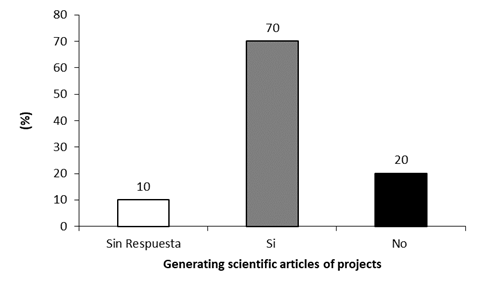 State University of Quevedo, Ecuador
State University of Quevedo, EcuadorFig. 5 - The projects allowed Faculty to generate scientific articles at Technical
Figure 6 shows that 60% of the Faculty surveyed consider relevant financial support for university project processes; 16.67% assert that training is necessary, and an equal percentage consider that collaboration of the population as object of study is required. Furthermore, 16.67% consider counseling necessary.
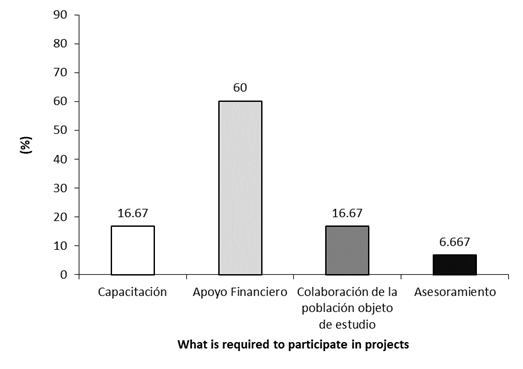 State University of Quevedo, Ecuador
State University of Quevedo, EcuadorFig. 6 - Faculty participation in projects of university processes at Technical
University institutions in compliance to their social function are obligated to develop scientific research that contributes to society development and current problem solutions (Méndez-Martínez et al., 2021b). Likewise, dissemination of the results is significant. Facing such effects, Faculty integrating to research projects is relevant.
The results obtained in this research study evidenced that the majority of the Faculty (96.7%) according to Figure 4) have participated in some type of research project. Moreover, a considerable representation attributed a great relevance to cacao research projects in the municipality Cantón de Quevedo, which in this manner provides service to its production. In this sense, it should be highlighted that it is one of the main sources of income and social welfare for the population in the region. This link to research projects allowed generating scientific articles (70% according to Figure 5).
The results are considered in agreement to the state policies that have been implemented in Ecuador to assure quality in education. From the perspective of Ângulo et al. (2021), a transition has been established generating substantial changes and stimulus in research. Likewise, these results are in equilibrium with UTEQ education model. In this sense, Morales-Torres et al. (2022), highlight research dimension, scientific production dissemination and generation of knowledge as transversal axes.
The results of this study are also in agreement with Rodríguez et al. (2020), the National Ministry of Higher Education (Secretaría Nacional de Educación Superior), Science, Technology and Innovation (Ciencia, Tecnología e Innovación, SENESCYT) in Ecuador. To such effects, SENESCYT gives rise to programs that imply universities to articulate research projects, for which it rules studies with the intention to accelerate innovation models.
As demonstrated by Iman et al. (2021), an increase in scientific production has been perceived in universities and index journals in prestige databases in Ecuador, which confer a great visibility to the institution. These authors consider that this increase is due to the public policies that have been implemented, such as project development dealt with in this study.
Despite the fact that research evidenced a high percentage of Faculty participation in projects, this parameter at UTEQ has not been resolved yet. New professors should be linked to projects every day to achieve a higher percentage in participation. Furthermore, logistic questions (financial support, counseling, and training) should be solved since this study evidenced that these elements are necessary to participate in research projects (Figure 6).
The detected limitation in research in this study is also supported by Gómez et al. (2019), who consider that participation and new research project proposals are conditioned to scarce theoretical and practical knowledge for their formulation.
Conclusions
Research projects lead to strengthening capabilities and elevate education levels. In UTEQ many Faculty members are linked to research projects, especially in the case of cacao, which impacts university processes and scientific productions. The policies that guarantee financial support, counseling and training should be reinforced in the interest of increasing scientific production and visibility of research results.













